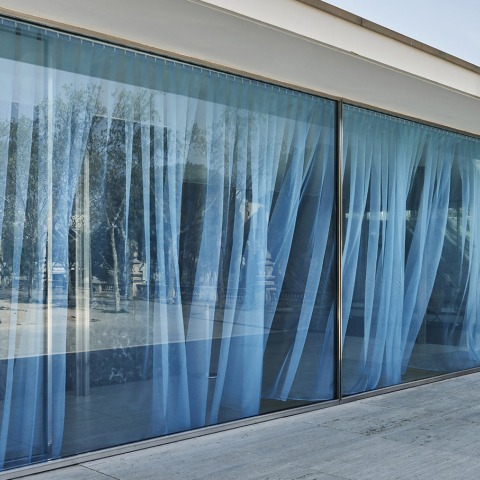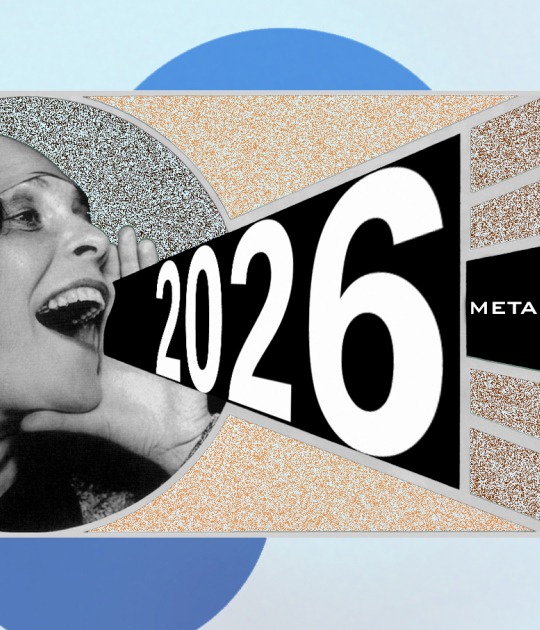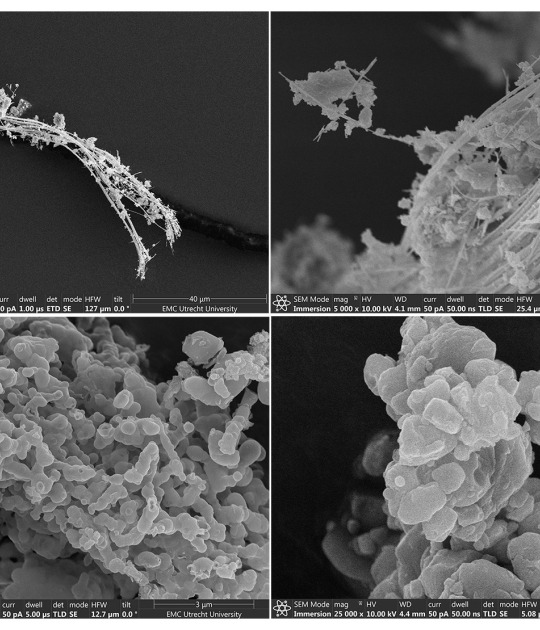Fundació Mies van der Rohe presents, a site-specific piece shown as part of the retrospective exhibition at MACBA of the work Politics of Relationship by Felix Gonzalez-Torres. The exhibition "Untitled" (Loverboy) - Felix Gonzalez-Torres, links the cryptic subtlety of Felix Gonzalez-Torres with the materiality of the Pavilion itself.
The intentionally cryptic subtlety of the work now presented in the Pavilion underlines the impact of the materialities of each surface. The curtain of dense, heavy, falling colour, which together with the onyx and the carpet adds the third colour of the German flag, becomes a very light, undulating, light blue tulle that flutters beyond the end of the window.
Ivan Blasi, curator of the programmes of Fundació Mies van der Rohe who has coordinated and organised the specific proposal for the Pavilion of the piece, says.-
"The presentation of "Untitled" (Loverboy) is part of the collaborations with teams and institutions in the city of Barcelona.
A blue curtain replaces the red one and issues of memory, authority, freedom and national identity are emphasised; the Pavilion was commissioned by the Weimar Republic in the interwar period and while Spain is under monarchy and dictatorship. A blue curtain that in each presentation is produced anew and gets its own registration number, giving a continuous life to the work.
An absolutely different and highly recommendable experience in the Pavilion".
The blue thus represents a reformulation of the architectural context of the van der Rohe Pavilion, which was commissioned by the Weimar Republic during the interwar period during which Spain was plunged between the dictatorship and the current monarchy. By including this color, which is absent from both flags, the sample redefines the space, contextualizing it in the present and adapting it to the content of González-Torres's work itself.
In the work of Gonzalez-Torres - American, born in Guáimaro (Cuba) in 1957 and deceased in Miami (United States) in 1996 - always in transit between contexts and identities, blue often represents love or beauty, but also fear.
The fact of developing a subtle language about the queer condition, which prioritises romanticism and reformulates the language of minimalism and conceptualism as vehicles for affective content, is one of his main contributions to his aesthetic canon.
This installation, consisting of translucent fabric curtains that tint the light of the Mies van der Rohe Pavilion blue, introduces a new sensuality to the architectural space. It is a special work because it is the only one that is assigned a new inventory number each time it is produced.
Even though the author is no longer present, the piece continues to evolve. The overall exhibition curated by Tanya Barson offers a political reading of Gonzalez-Torres' work in relation to postcolonial discourse and the anti-fascist fight, mainly in Spain and the Americas, their shared histories and commonalities, and how they impact on a personal level through issues of memory, authority, freedom and national identity. In the case of the installation in the Pavilion it also addresses the formative importance of Gonzalez-Torres' work in queer aesthetics.
In the exhibition, all these aspects are related, for example through the dialogue between militarism and homoeroticism, or through Gonzalez-Torres' engagement with the idea of the monument, which can be related to narratives of race, colonialism and fascism.

































